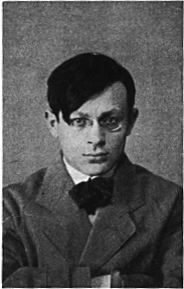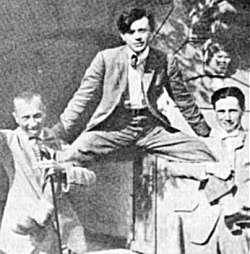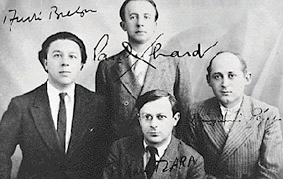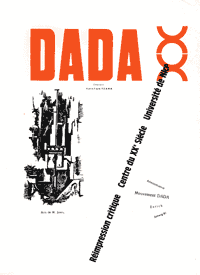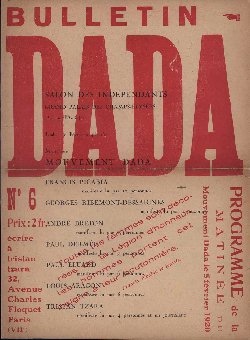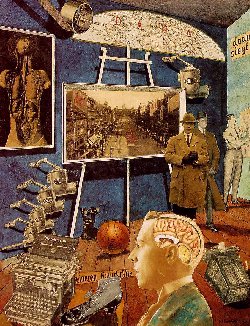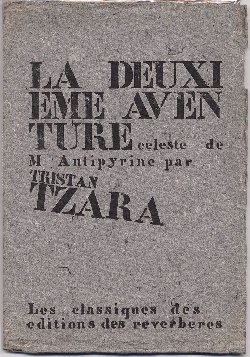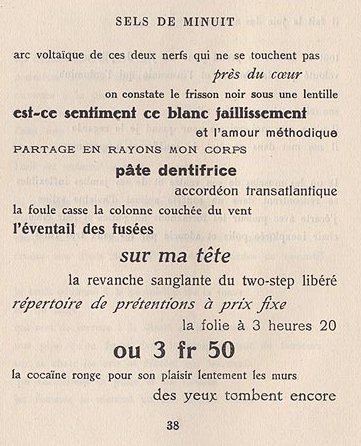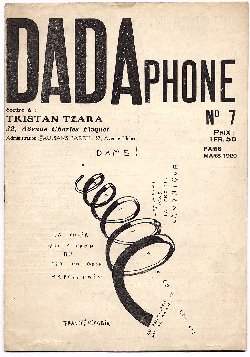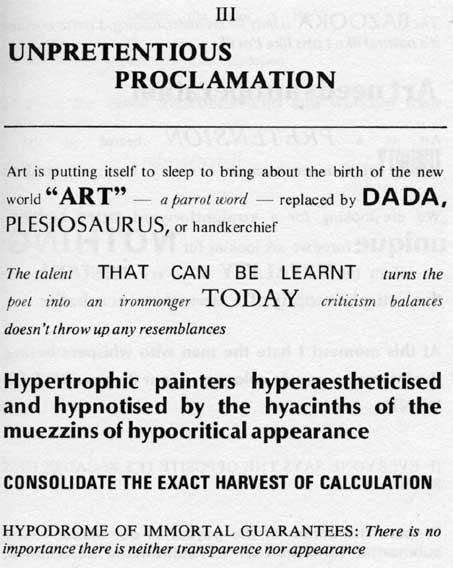| Tristan Tzara
The Art History Archive - DADA
Biography, DADAism & Poetry
Born 1896, Moinesti, Romania. Died December 1963, Paris, France. Tristan Tzara (Samuel Rosenstock/Rosenstein) Romanian-born French poet and essayist known mainly as a founder of Dada, a nihilistic revolutionary movement in the arts. The Dadaist movement originated in Zürich during World War I; Tzara wrote the first Dada texts - La Premiére Aventure cèleste de Monsieur Antipyrine (1916; "The First Heavenly Adventure of Mr. Antipyrine") and Vingt-cinq poémes (1918; "Twenty-Five Poems") - and the movement's manifestos, Sept manifestes Dada (1924; "Seven Dada Manifestos"). In Paris he engaged in tumultuous activities with André Breton, Philippe Soupault, and Louis Aragon to shock the public and to disintegrate the structures of language. About 1930, weary of nihilism and destruction, he joined his friends in the more constructive activities of Surrealism. He devoted much of his time to the reconciliation of Surrealism and Marxism and joined the Communist Party in 1936 and the French Resistance movement during World War II. These political commitments brought him closer to his fellow human beings, and he gradually matured into a lyrical poet. His poems revealed the anguish of his soul, caught between revolt and wonderment at the daily tragedy of the human condition. His mature works started with L'Homme approximatif (1931; "The Approximate Man") and continued with Parler seul (1950; "Speaking Alone") and La Face intèrieure (1953; "The Inner Face"). In these, the anarchically scrambled words of Dada were replaced with a difficult but humanized language. Biography of Tristan Tzara Tzara born in Moinesti, Bacau, Romania to a family of Romanian-speaking Jewish ancestry. Tzara wrote the first Dada texts, La Première Aventure céleste de Monsieur Antipyrine (The First Heavenly Adventure of Mr. Antipyrine) (1916), Vingt-cinq poèmes (Twenty-Five Poems) (1918) [1], and the movement's manifestos, Sept manifestes Dada (Seven Dada Manifestos) (1924). In Paris he engaged in tumultuous activities with Dadaists André Breton, Philippe Soupault, and Louis Aragon to shock the public and to disintegrate the structures of language. In late 1929, weary of nihilism and destruction, he joined his friends in the more constructive activities of Surrealism. He devoted much of his time to the reconciliation of Surrealism and Marxism and joined the French Communist Party in 1937. He was active in the French Resistance movement during World War II. He left the Communist Party in 1956, in protest against the Soviet quelling of the Hungarian Revolution. His political commitments brought him closer to his fellow human beings, and he gradually matured into a lyrical poet. His poems revealed the anguish of his soul, caught between revolt and wonderment at the daily tragedy of the human condition. His mature works started with L'Homme approximatif (The Approximate Man) (1931), and continued with Parler seul (Speaking Alone) (1950), and La Face intérieure (The Inner Face) (1953). In these, the anarchically scrambled words of Dada were replaced with a difficult but humanized language. He died in Paris and was interred there in the Cimetière du Montparnasse.
Dadaism
From "Dada Manifesto" [1918] and "Lecture on Dada" [1922], translated from the French by Robert Motherwell, *Dada Painters and Poets*, by Robert Motherwell, New York, pp. 78- 9, 81, 246-51; reprinted by pernlission of George Wittenborn, Inc., Publishers, 10l8 Madison Avenue, New York 21, N.Y. *There is a literature that does not reach the voracious mass. It is the work of creators, issued from a real necessity in the author, produced for himself. It expresses the knowledge of a supreme egoism, in which laws wither away. Every page must explode, either by profound heavy seriousness, the whirlwind, poetic frenzy, the new, the eternal, the crushing joke, enthusiasm for principles, or by the way in which it is printed. On the one hand a tottering world in flight, betrothed to the glockenspiel of hell, on the other hand: new men. Rough, bouncing, riding on hiccups. Behind them a crippled world and literary quacks with a mania for improvement. I say unto you: there is no beginning and we do not tremble, we are not sentimental. We are a furious Wind, tearing the dirty linen of clouds and prayers, preparing the great spectacle of disaster, fire, decomposition.* We will put an end to mourning and replace tears by sirens screeching from one continent to another. Pavilions of intense joy and widowers with the sadness of poison. Dada is the signboard of abstraction; advertising and business are also elements of poetry.
I destroy the drawers of the brain and of social organization: spread demoralization wherever I go and cast my hand from heaven to hell, my eyes from hell to heaven, restore the fecund wheel of a universal circus to objective forces and the imagination of every individual. Philosophy is the question: from which side shall we look at life, God, the idea or other phenomena. Everything one looks at is false. I do not consider the relative result more important than the choice between cake and cherries after dinner. The system of quickly looking at the other side of a thing in order to impose your opinion indirectly is called dialectics, in other words, haggling over the spirit of fried potatoes while dancing method around it. If I cry out: Ideal, ideal, ideal,
I have given a pretty faithful version of progress, law, morality and all other fine qualities that various highly intelligent men have discussed in so manv books, only to conclude that after all everyone dances to his own personal boomboom, and that the writer is entitled to his boomboom: the satisfaction of pathological curiosity; a private bell for inexplicable needs; a bath; pecuniary difficulties; a stomach with repercussions in life; the authority of the mystic wand formulated as the bouquet of a phantom orchestra made up of silent fiddle bows greased with philtres made of chicken manure. With the blue eye-glasses of an angel they have excavated the inner life for a dime's worth of unanimous gratitude. If all of them are right and if all pills are Pink Pills, let us try for once not to be right. Some people think they can explain rationally, by thought, what they think. But that is extremely relative. Psychoanalysis is a dangerous disease, it puts to sleep the anti-objective impulses of men and systematizes the bourgeoisie. There is no ultimate Truth. The dialectic is an amusing mechanism which guides us / in a banal kind of way / to the opinions we had in the first place. Does anyone think that, by a minute refinement of logic, he has demonstrated the truth and established the correctness of these opinions? Logic imprisoned by the senses is an organic disease. To this element philosophers always like to add: the power of observation. But actually this magnificent quality of the mind is the proof of its impotence. We observe, we regard from one or more points of view, we choose them among the millions that exist. Experience is also a product of chance and individual faculties. Science disgusts me as soon as it becomes a speculative system, loses its character of utility-that is so useless but is at least individual. I detest greasy objectivity, and harmony, the science that finds everything in order. Carry on, my children, humanity . . . Science says we are the servants of nature: everything is in order, make love and bash your brains in. Carry on, my children, humanity, kind bourgeois and journalist virgins . . . I am against systems, the most acceptable system is on principle to have none. To complete oneself, to perfect oneself in one's own littleness, to fill the vessel with one's individuality, to have the courage to fight for and against thought, the mystery of bread, the sudden burst of an infernal propeller into economic lilies.... Every product of disgust capable of becoming a negation of the family is Dada; a protest with the fists of its whole being engaged in destructivc action: *Dada; knowledge of all the means rejected up until now by the shamefaced sex of comfortable compromise and good manners: Dada; abolition of logic, which is the dance of those impotent to create: Dada; of every social hierarchy and equation set up for the sake of values by our valets: Dada; every object, all objects, sentiments, obscurities, apparitions and the precise clash of parallel lines are weapons for the fight: Dada; abolition of memory: Dada; abolition of archaeology: Dada; abolition of prophets: Dada; abolition of the future: Dada; absolute and unquestionable faith in every god that is the immediate product of spontaneity:* Dada; elegant and unprejudiced leap from a harmony to the other sphere; trajectory of a word tossed like a screeching phonograph record; to respect all individuals in their folly of the moment: whether it be serious, fearful, timid, ardent, vigorous, determined, enthusiastic; to divest one's church of every useless cumbersome accessory; to spit out disagreeable or amorous ideas like a luminous waterfall, or coddle them -with the extreme satisfaction that it doesn't matter in the least-with the same intensity in the thicket of one's soul-pure of insects for blood well-born, and gilded with bodies of archangels. Freedom: Dada Dada Dada, a roaring of tense colors, and interlacing of opposites and of all contradictions, grotesques, inconsistencies: LIFE
Ladies and Gentlemen:
I don't have to tell you that for the general public and for you, tlhe refined public, a Dadaist is the equivalent of a leper. But that is only a manner of speaking. When these same people get close to us, they treat us with that remnant of elegance that comes from their old habit of belief in progress. At ten yards distance, hatred begins again. If you ask me why, I won't be able to tell you. Another characteristic of Dada is the continuous breaking off of our friends. They are always breaking off and resigning. The first to tender his resignation from the Dada movement *was myself.* Everybody knows that Dada is nothing. I broke away from Dada and from myself as soon as I understood the implications of *nothing.* If I continue to do something, it is because it amuses me, or rather because I have a need for activity which I use up and satisfy wherever I can. Basically, the true Dadas have always been separate from Dada. Those who acted as if Dada were important enough to resign from with a big noise have been motivated by a desire for personal publicity, proving that counterfeiters have always wriggled like unclean worms in and out of the purest and most radiant religions. I know that you have come here today to hear explanations. Well, don't expect to hear any explanations about Dada. You explain to me why you exist. You haven't the faintest idea. You will say: I exist to make my children happy. But in your hearts you know that isn't so. You will say: I exist to guard my country, against barbarian invasions. That's a fine reason. You will say: I exist because God wills. That's a fairy tale for children. You will never be able to tell me why you exist but you will always be ready to maintain a serious attitude about life. You will never understand that life is a pun, for you will never be alone enough to reject hatred, judgments, all these things that require such an effort, in favor of a calm level state of mind that makes everything equal and without importance. Dada is not at all modern. It is more in the nature of a return to an almost Buddhist religion of indifference. Dada covers things with an artificial gentleness, a snow of butterflies released from the head of a prestidigitator. Dada is immobility and does not comprehend the passions. You will call this a paradox, since Dada is manifested only in violent acts. Yes, the reactions of individuals contaminated by *destruction* are rather violent, but when these reactions are exhausted, annihilated by the Satanic insistence of a continuous and progressive "What for?" what remains, what dominates is *indifference.* But with the same note of conviction I might maintain the contrary. I admit that my friends do not approve this point of view. But the *Nothing* can be uttered only as the reflection of an individual. And that is why it will be valid for everyone, since everyone is important only for the individual who is expressing himself.--I am speaking of myself. Even that is too much for me. How can I be expected to speak of all men at once, and satisfy them too? Nothing is more delightful than to confuse and upset people. People one doesn't like. What's the use of giving them explanations that are merely food for curiosity? The truth is that people love nothing but themselves and their little possessions, their income, their dog. This state of affairs derives from a false conception of property. If one is poor in spirit, one possesses a sure and indomitable intelligence, a savage logic, a point of view that can not be shaken. Try to be empty and fill your brain cells with a petty happiness. Always destroy what you have in you. On random walks. Then you will be able to understand many things. You are not more intelligent than we, and we are not more intelligent than you. Intelligence is an organization like any other, the organization of society, the organization of a bank, the organization of chit-chat. At a society tea. It serves to create order and clarity where there is none. It serves to create a state hierarchy. To set up classifications for rational work. To separate questions of a material order from those of a cerebral ordcr, but to take the former very seriously. Intelligence is the triumph of sound education and pragmatism. Fortunately life is something else and its pleasures are innumerable. They are not paid for in the coin of liquid intelligence. These observations of everyday conditions have led us to a realization which constitutes our minimum basis of agreement, aside from the sympathy which binds us and which is inexplicable. It would not have been possible for us to found our agreement on principles. For everything is relative. What are the Beautiful, the Good, Art, Freedom? Words that have a different meaning for every individual. Words with the pretension of creating agreement among all, and that is why they are written with capital letters. Words which have not the moral value and objective force that people have grown accustomed to finding in them. Their meaning changes from one individual, one epoch, one country to the next. Men are different. It is diversity that makes life interesting. There is no common basis in mens minds. The unconscious is inexhaustible and uncontrollable. Its force surpasses us. It is as mysterious as the last particle of a brain cell. Even if we knew it, we could not reconstruct it. What good did the theories of the philosophers do us? Did they help us to take a single step forward or backward? What is forward, what is backward? Did they alter our forms of contentment? We are. We argue, we dispute, we get excited. The rest is sauce. Sometimes pleasant, sometimes mixed with a limitless boredom, a swamp dotted with tufts of dying shrubs. We have had enough of the intelligent movements that have stretched beyond measure our credulity in the benefits of science. What we want now is spontaneity. Not because it is better or more beautiful than anything else. But because everything that issues freely from ourselves, without the intervention of speculative ideas, represents us. We must intensify this quantity of life that readily spends itself in every quarter. Art is not the most precious manifestation of life. Art has not the celestial and universal value that people like to attribute to it. Life is far more interesting. Dada knows the correct measure that should be given to art: with subtle, perfidious methods, Dada introduces it into daily life. And vice versa. In art, Dada reduces everything to an initial simplicity, growing always more relative. It mingles its caprices with the chaotic wind of creation and the barbaric dances of savage tribes. It wants logic reduced to a personal minimum, while literature in its view should be primarily intended for the individual who makes it. Words have a weight of their own and lend themselves to abstract construction. The absurd has no terrors for me, for from a more exalted point of view everything in life seems absurd to me. Only the elasticity of our conventions creates a bond between disparate acts. The Beautiful and the True in art do not exist; what interests me is the intensity of a personality transposed directly, clearly into the work; the man and his vitality; the angle from which he regards the elements and in what manner he knows how to gather sensation, emotion, into a lacework of words and sentiments. Dada tries to find out what words mean before using them, from the point of view not of grammar but of representation. Objects and colors pass through the same filter. It is not the new technique that interests us, but the spirit. Why do you want us to be preoccupied with a pictorial, moral, poetic, literary, political or social renewal? We are well aware that these renewals of means are merely the successive cloaks of the various epochs of history, uninteresting questions of fashion and facade. We are well aware that people in the costumes of the Renaissance were pretty much the same as the people of today, and that Chouang-Dsi was just as Dada as we are. You are mistaken if you take Dada for a modern school, or even for a reaction against the schools of today. Several of my statements have struck you as old and natural, what better proof that you were a Dadaist without knowing it, perhaps even before the birth of Dada. You will often hear that Dada is a state of mind. You may be gay, sad, afflicted, joyous, melancholy or Dada. Without being literary, you can be romantic, you can be dreamy, weary, eccentric, a businessman, skinny, transfigured, vain, amiable or Dada. This will happen later on in the course of history when Dada has become a precise, habitual word, when popular repetition has given it the character of a word organic with its necessary content. Today no one thinks of the literature of the Romantic school in representing a lake, a landscape, a character. Slowly but surely, a Dada character is forming. Dada is here, there and a little everywhere, such as it is, with its faults, with its personal differences and distinctions which it accepts and views with indifference. We are often told that we are incoherent, but into this word people try to put an insult that it is rather hard for me to fathom. Everything is incoherent. The gentleman who decides to take a bath but goes to the movies instead. The one who wants to be quiet but says things that haven't even entered his head. Another who has a precise idea on some subject but succeeds only in expressing the opposite in words which for him are a poor translation. There is no logic. Only relative necessities discovered *a posteriori*, valid not in any exact sense but only as explanations. The acts of life have no beginning or end. Everything happens in a completely idiotic way. That is why everything is alike. Simplicity is called Dada.
Any attempt to conciliate an inexplicable momentary state with logic strikes me as a boring kind of game. The convention of the spoken language is ample and adequate for us, but for our solitude, for our intimate games and our literature we no longer need it.
The beginnings of Dada were not the beginnings of an art, but of a disgust. Disgust with the magnificence of philosophers who for 3ooo years have been explaining everything to us (what for? ), disgust with the pretensions of these artists-God's-representatives-on-earth, disgust with passion and with real pathological wickedness where it was not worth the bother; disgust with a false form of domination and restriction *en masse*, that accentuates rather than appeases man's instinct of domination, disgust with all the catalogued categories, with the false prophets who are nothing but a front for the interests of money, pride, disease, disgust with the lieutenants of a mercantile art made to order according to a few infantile laws, disgust with the divorce of good and evil, the beautiful and the ugly (for why is it more estimable to be red rather than green, to the left rather than the right, to be large or small?). Disgust finally with the Jesuitical dialectic which can explain everything and fill people's minds with oblique and obtuse ideas without any physiological basis or ethnic roots, all this by means of blinding artifice and ignoble charlatans promises. As Dada marches it continuously destroys, not in extension but in itself. From all these disgusts, may I add, it draws no conclusion, no pride, no benefit. It has even stopped combating anything, in the realization that it's no use, that all this doesn't matter. What interests a Dadaist is his own mode of life. But here we approach the great secret. Dada is a state of mind. That is why it transforms itself according to races and events. Dada applies itself to everything, and yet it is nothing, it is the point where the yes and the no and all the opposites meet, not solemnly in the castles of human philosophies, but very simply at street corners, like dogs and grasshoppers. Like everything in life, Dada is useless. Dada is without pretension, as life should be. Perhaps you will understand me better when I tell you that Dada is a virgin microbe that penetrates with the insistence of air into all the spaces that reason has not been able to fill with words or conventions.
|
|
|
Cinema Calendar Of The Abstract Heart - 09 the fibres give in to your starry warmth a lamp is called green and sees carefully stepping into a season of fever the wind has swept the rivers' magic and i've perforated the nerve by the clear frozen lake has snapped the sabre but the dance round terrace tables shuts in the shock of the marble shudder new sober Tristan Tzara Proclamation Without Pretension Art is going to sleep for a new world to be born "ART"-parrot word-replaced by DADA, PLESIOSAURUS, or handkerchief The talent THAT CAN BE LEARNED makes the poet a druggist TODAY the criticism of balances no longer challenges with resemblances Hypertrophic painters hyperaes- theticized and hypnotized by the hyacinths of the hypocritical-looking muezzins CONSOLIDATE THE HARVEST OF EX- ACT CALCULATIONS Hypodrome of immortal guarantees: there is no such thing as importance there is no transparence or appearance MUSICIANS SMASH YOUR INSTRUMENTS BLIND MEN take the stage THE SYRINGE is only for my understanding. I write because it is natural exactly the way I piss the way I'm sick ART NEEDS AN OPERATION Art is a PRETENSION warmed by the TIMIDITY of the urinary basin, the hysteria born in THE STUDIO We are in search of the force that is direct pure sober UNIQUE we are in search of NOTHING we affirm the VITALITY of every IN- STANT the anti-philosophy of spontaneous acrobatics At this moment I hate the man who whispers before the intermission-eau de cologne- sour theatre. THE JOYOUS WIND If each man says the opposite it is because he is right Get ready for the action of the geyser of our blood -submarine formation of transchromatic aero- planes, cellular metals numbered in the flight of images above the rules of the and its control BEAUTIFUL It is not for the sawed-off imps who still worship their navel Tristan Tzara The Great Lament Of My Obscurity Three where we live the flowers of the clocks catch fire and the plumes encircle the brightness in the distant sulphur morning the cows lick the salt lilies my son my son let us always shuffle through the colour of the world which looks bluer than the subway and astronomy we are too thin we have no mouth our legs are stiff and knock together our faces are formeless like the stars crystal points without strength burned basilica mad : the zigzags crack telephone bite the rigging liquefy the arc climb astral memory towards the north through its double fruit like raw flesh hunger fire blood Tristan Tzara To Make A Dadist Poem Take a newspaper. Take some scissors. Choose from this paper an article the length you want to make your poem. Cut out the article. Next carefully cut out each of the words that make up this article and put them all in a bag. Shake gently. Next take out each cutting one after the other. Copy conscientiously in the order in which they left the bag. The poem will resemble you. And there you are--an infinitely original author of charming sensibility, even though unappreciated by the vulgar herd. Tristan Tzara Vegetable Swallow two smiles meet towards the child-wheel of my zeal the bloody baggage of creatures made flesh in physical legends-lives the nimble stags storms cloud over rain falls under the scissors of the dark hairdresser-furiously swimming under the clashing arpeggios in the machine's sap grass grows around with sharp eyes here the share of our caresses dead and departed with the waves gives itself up to the judgment of time parted by the meridian of hairs non strikes in our hands the spices of human pleasures Tristan Tzara
Tristan Tzara's Eighth Symphony
I. We began with the possibility of NOT writing : hence our timely arrival. Having chosen between apples & oranges, and opting for beef, we now sit at the feast of social construction, napkins on our heads. We give grace to our silent potentials, then eat them raw with an air of arrogant indifference. The scraps, bones and tendons, the parts of the animal they don't sell in stores, these constitute the foundation of make-up to which I will apply the blush of ontological negation, the no, the I-am-not, saddened and victimized individual eyeliner of intention. All of this just to say : we don't look like this in the morning; we're actually quite ugly but we like ourselves.
TRIUMPH #1 FOR THE INSCRUTABLE POWER OF CONSCIOUSNESS!!
If I am soon to be knocked unconscious, this will be the end of the manifesto : thank you for joining us, now go on home, move along, nothing to see here, nothing to see. Please deposit your bloodshot eyes at the door, give up your lightning-flash wit & tip your hat to the policeman while spitting on his shoes. Listen, it's a new era, we've all got short memories, and videocameras are the DADA instrument par excellence. (I didn't say that.)
TRIUMPH #1 FOR EMBRACING CONTRADICTION!!
He carries me across the threshold of pain, we risk devaluation, death, deconstruction, the tearing-down of our Lincoln Log platitudes. ONWARD!! There are many more triumphs to behold. (Tristan Tzara says to you : "Thought is made in the mouth." That's why I'm not thinking.) II. You imbeciles and Spanish teachers would perhaps like to know : what? when? whom? why? and other such insignificant questions. I don't like you, but I'll do what I can. DADA was born on the 8th of February, 1916, at a Café in Zurich by the slippery hand of Tristan Tzara, despite any malicious claims to the contrary made by the intelligent but foul-smelling André Breton, that green-eyed Pope of Surrealism, which, incidentally, is very much NOT DADA, especially in that it advocated descending into the streets with a revolver in each hand and shooting people at random. DADA, however, would most certainly opt for water pistols filled with Nair, and T-shirts proclaiming "There's no such word as superfluous in auto racing!" In fact, most of what I've just told you isn't true. DADA was not even born per se, but erupted with all the predictability of spontaneous volcanic activity on a planet similar to ours, but millions of light-years away. Go figure. Tristan Tzara, "a small, absurd, and insignificant individual," barely twenty years old, had already begun to accomplish what every BFA artist dreams of, and what never shows up on their tax returns. The essence of that Thing is NOTHING. The existence of this Thing is DADA. III. The Gyoto monks are DADA! Beggars who scoff at Yuppies are DADA! The potted plants on the windowledge of run-down apartments are DADA! Wet fish and dry land are DADA! The apparently limitless conglomeration of incoherent descriptions is DADA!
TRIUMPH #1 FOR CONFUSION AS ENLIGHTENMENT!!
(Triumphs, too, are DADA!) DADA, however, is not concerned with enlightenment -- it would rather sniff out snuff films, or propose the abolition of psychoanalyses of popular culture. We loved Pee-Wee Herman, now look what happened.
IV. They say that DADA was "a reaction against the unprecendented carnage of the world war." So what? Tristan Tzara says to you : "DADA is a virgin microbe that insinuates itself with the insistence of air into all the spaces that reason hasn't been able to fill with words or conventions." Now just whom will you believe, and what are you willing to pay for it? DADA is about endlessly choosing your sword, then dropping it in favor of laughter at a most inappropriate moment. And it's dead serious. Dead. But what's death these days but an epithet? We've abolished History, Art, Authors, and soon enough, we shall be out of cellophane. It's a bad rap. That's yesterday's bad joke. DADA had accomplished the entire repertoire of postmodern psychobabble criticism before the short algerian was even trying to suckle his maman's left nipple. V. We are against MTV, which is DADA + capital, and therefore not DADA. We kill televisions to amuse ourselves, or simply destroy the picture-tube so nothing but an orange glow emanates from the screen. Make popcorn, sit down, & discuss the relative values of eastern philosophy & college-level poetry writing classes. We have a love/hate relationship with the Tao, and don't understand T.S. Eliot.
TRIUMPH #1 FOR THE BUDDHA MIND!!
But we really couldn't care less. Intelligence is a double-entendre, which is french, you know, but that doesn't make the French intelligent, or even intelligible.
TRIUMPH #1 FOR...OH SHIT I CAN'T REMEMBER,
VI.
"DADA -- this is a word that throws up ideas so that they can be shot down; every bourgeois is a little playwright, who invents different subjects, and who, instead of situating suitable characters on the level of his own intelligence, like chrysalises or chairs, tries to find causes or objects (according to whichever psychoanalytic method he practises) to give weight to his plot, a talking and self-defining story."
(SO DO I! ADDS KOKO THE CLOWN.) VII.
The score thus far : Telephone calls : 3, Mail-Pak Coupons : 0
TRIUMPH #1 ALL AROUND!!
IX. You see, DADA is a myriad of self-defeating footballs teams of wisdom. We don't like winning, which signals the end of the game. We don't even mind being misunderstood, which gives us reason to write more manifestos. (NO MORE MANIFESTOS! interrupts Tristan Tzara.) (BUT HE'S DEAD! SCREAMS KOKO, OBVIOUSLY SURPRISED.) And DADA, too, which died even before it was born, nonetheless makes cameo appearances around the globe in various disguises, most of them too obscure to hit the front pages. (Those, too, are DADA!) The Cravats, the Very Things, the Babymen, and D.C.L. Locomotive; Nurse With Wound, David Thomas, and D.D.A.A. have animated the underbelly of DADA's corpse. Monty Python was the paramilitary wing of DADA's Politics of Humor campaign. The marriage of Xerox machines and street lampposts is a veritable DADA museum. Politicians are NOT DADA no matter how hard they try. Tristan Tzara, whose name is virtually synonymous with Tristan Tzara, is still very DADA. And if you've understood nothing, that's DADA Zen.
NOW GO HOME!!
MONSIEUR ANTIPYRINE'S MANIFESTO
DADA is our intensity: it erects inconsequential bayonets and the Sumatral head of German babies; Dada is fife with neither bedroom slippers nor parallels; it is against and for unity and definitely against the future; we are wise enough to know that our brains are going to become flabby cushions, that our antidogmatism is as exclusive as a civil servant, and that we cry liberty but are not free; a severe necessity with neither discipline nor morals and that we spit on humanity. DADA remains within the framework of European weaknesses, it's still shit, but from now on we want to shit in different colours so as to adorn the zoo of art with all the flags of all the consulates. We are circus ringmasters and we can be found whistling amongst the winds of fairgrounds, in convents, prostitutions, theatres, realities, feelings, restaurants, ohoho, bang bang. We declare that the motor car is a feeling that has cosseted us quite enough in the dilatoriness of its abstractions, as have transatlantic liners, noises and ideas. And while we put on a show of being facile, we are actually searching for the central essence of things, and are pleased if we can hide it; we have no wish to count the windows of the marvellous elite, for DADA doesn't exist for anyone, and we want everyone to understand this. This is Dada's balcony, I assure you. From there you can hear all the military marches, and come down cleaving the air like a seraph landing in a public baths to piss and understand the parable. DADA is neither madness, nor wisdom, nor irony, look at me, dear bourgeois. Art used to be a game of nuts in May, children would go gathering words that had a final ring, then they would exude, shout out the verse, and dress it up in dolls' bootees, and the verse became a queen in order to die a little, and the queen became a sardine, and the children ran hither and yon, unseen ... Then came the great ambassadors of feeling, who yelled historically in chorus:
Psychology Psychology hee hee
But we, DADA, don't agree with them, for art isn't serious, I assure you, and if we reveal the crime so as to show that we are learned denunciators, it's to please you, dear audience, I assure you, and I adore you.
DADA MANIFESTO 1918
The magic of a word- DADA-
To launch a manifesto you have to want: A.B. & C., and fulminate against 1, 2, & 3, work yourself up and sharpen your wings to conquer and circulate lower and upper case As, Bs & Cs, sign, shout, swear, organise prose into a form that is absolutely and irrefutably obvious, prove its ne plus ultra and maintain that novelty resembles life in the same way as the latest apparition of a harlot proves the essence of God. His existence had already been proved by the accordion, the landscape and soft words. * To impose one's A.B.C. is only natural - and therefore regrettable. Everyone does it in the form of a crystalbluff-madonna, or a monetary system, or pharmaceutical preparations, a naked leg being the invitation to an ardent and sterile Spring. The love of novelty is a pleasant sort of cross, it's evidence of a naive don't-give-a-damn attitude, a passing, positive, sign without rhyme or reason. But this need is out of date, too. By giving art the impetus of supreme simplicity - novelty -we are being human and true in relation to innocent pleasures; impulsive and vibrant in order to crucify boredom. At the lighted crossroads, alert, attentive, lying in wait for years, in the forest. I am writing a manifesto and there's nothing I want, and yet I'm saying certain things, and in principle I am against manifestos, as I am against principles (quantifying measures of the moral value of every phrase - too easy; approximation was invented by the impressionists). I'm writing this manifesto to show that you can perform contrary actions at the same time, in one single, fresh breath; I am against action; as for continual contradiction, and affirmation too, I am neither for nor against them, and I won't explain myself because I hate common sense. DADA - this is a word that throws up ideas so that they can be shot down; every bourgeois is a little playwright, who invents 1 different subjects and who, instead of situating suitable characters on the level of his own intelligence, like chrysalises on chairs, tries to find causes or objects (according to whichever psychoanalytic method he practises) to give weight to his plot, a talking and self-defining story. Every spectator is a plotter, if he tries to explain a word (to know!) From his padded refuge of serpentine complications, he allows his instincts to be manipulated. Whence the sorrows of conjugal life. To be plain: The amusement of redbellies in the mills of empty skulls. DADA DOES NOT MEAN ANYTHING If we consider it futile, and if we don't waste our time over a word that doesn't mean anything ... The first thought that comes to these minds is of a bacteriological order: at least to discover its etymological, historical or psychological meaning. We read in the papers that the negroes of the Kroo race call the tail of a sacred cow: DADA. A cube, and a mother, in a certain region of Italy, are called: DADA. The word for a hobbyhorse, a children's nurse, a double affirmative in Russian and Roumanian, is also: DADA. Some learned journalists see it as an art for babies, other Jesuscallingthelittlechildrenuntohim saints see it as a return to an unemotional and noisy primitivism- noisy and monotonous. A sensitivity cannot be built on the basis of a word; every sort of construction converges into a boring sort of perfection, a stagnant idea of a golden swamp, a relative human product. A work of art shouldn't be beauty per se, because it is dead; neither gay nor sad, neither light nor dark; it is to rejoice or maltreat individualities to serve them up the cakes of sainted haloes or the sweat of a meandering chase through the atmosphere. A work of art is never beautiful, by decree, objectively, for everyone. Criticism is, therefore, useless; it only exists subjectively, for every individual, and without the slightest general characteristic. Do people imagine they have found the psychic basis common to all humanity? The attempt of Jesus, and the Bible, conceal, under their ample, benevolent wings: shit, animals and days. How can anyone hope to order the chaos that constitutes that infinite, formless variation: man? The principle: "Love thy neighbour" is hypocrisy. "Know thyself" is utopian, but more acceptable because it includes malice. No pity. After the carnage we are left with the hope of a purified humanity. I always speak about myself because I don't want to convince, and I have no right to drag others in my wake, I'm not compelling anyone to follow me, because everyone makes his art in his own way, if he knows anything about the joy that rises like an arrow up to the astral strata, or that which descends into the mines strewn with the flowers of corpses and fertile spasms. Stalactites: cook everywhere for them, in creches magnified by pain, eyes as white as angels' hares. Thus DADA was born*, out of a need for independence, out of mistrust for the community. People who join us keep their freedom. We don't accept any theories. We've had enough of the cubist and futurist academies: laboratories of formal ideas. Do we make art in order to earn money and keep the dear bourgeoisie happy? Rhymes have the smack of money, and inflexion slides along the line of the stomach in profile. Every group of artists has ended up at this bank, straddling various comets. Leaving the door open to the possibility of wallowing in comfort and food. Here we are dropping our anchor in fertile ground. Here we really know what we are talking about, because we have experienced the trembling and the awakening. Drunk with energy, we are revenants thrusting the trident into heedless flesh. We are streams of curses in the tropical abundance of vertiginous vegetation, resin and rain is our sweat, we bleed and burn with thirst, our blood is strength. Cubism was born out of a simple manner of looking at objects: Cezanne painted a cup twenty centimetres lower than his eyes, the cubists look at it from above, others complicate its appearance by cutting a vertical section through it and soberly placing it to one side. (I'm not forgetting the creators, nor the seminal reasons of unformed matter that they rendered definitive.) The futurist sees the same cup in movement, a succession of objects side by side, mischievously embellished by a few guide-lines. This doesn't stop the canvas being either a good or a bad painting destined to form an investment for intellectual capital. The new painter creates a world whose elements are also its means, a sober, definitive, irrefutable work. The new artist protests: he no longer paints (symbolic and illusionistic reproduction) but creates directly in stone, wood, iron, tin, rocks, or locomotive structures capable of being spun in all directions by the limpid wind of the momentary sensation. Every pictorial or plastic work is unnecessary, even if it is a monster which terrifies servile minds, and not a sickly-sweet object to adorn the refectories of animals in human garb, those illustrations of the sad fable of humanity. A painting is the art of making two lines, which have been geometrically observed to be parallel, meet on a canvas, before our eyes, in the reality of a world that has been transposed according to new conditions and possibilities. This world is neither specified nor defined in the work, it belongs, in its innumerable variations, to the spectator. For its creator it has neither cause nor theory. Order = disorder; ego = non?ego; affirmation = negation: the supreme radiations of an absolute art. Absolute in the purity of its cosmic and regulated chaos, eternal in that globule that is a second which has no duration, no breath, no light and no control. I appreciate an old work for its novelty. It is only contrast that links us to the past. Writers who like to moralise and discuss or ameliorate psychological bases have, apart from a secret wish to win, a ridiculous knowledge of life, which they have classified, parcelled out, canalised; they are determined to see its categories dance when they beat time. Their readers laugh derisively, but carry on: what's the use? There is one kind of literature which never reaches the voracious masses. The work of creative writers, written out of the author's real necessity, and for his own benefit. The awareness of a supreme egoism, wherein laws become insignificant. Every page should explode, either because of its profound gravity, or its vortex, vertigo, newness, eternity, or because of its staggering absurdity, the enthusiasm of its principles, or its typography. On the one hand there is a world tottering in its flight, linked to the resounding tinkle of the infernal gamut; on the other hand, there are: the new men. Uncouth, galloping, riding astride on hiccups. And there is a mutilated world and literary medicasters in desperate need of amelioration. I assure you: there is no beginning, and we are not afraid; we aren't sentimental. We are like a raging wind that rips up the clothes of clouds and prayers, we are preparing the great spectacle of disaster, conflagration and decomposition. Preparing to put an end to mourning, and to replace tears by sirens spreading from one continent to another. Clarions of intense joy, bereft of that poisonous sadness. DADA is the mark of abstraction; publicity and business are also poetic elements. I destroy the drawers of the brain, and those of social organisation: to sow demoralisation everywhere, and throw heaven's hand into hell, hell's eyes into heaven, to reinstate the fertile wheel of a universal circus in the Powers of reality, and the fantasy of every individual. A philosophical question: from which angle to start looking at life, god, ideas, or anything else. Everything we look at is false. I don't think the relative result is any more important than the choice of patisserie or cherries for dessert. The way people have of looking hurriedly at things from the opposite point of view, so as to impose their opinions indirectly, is called dialectic, in other words, heads I win and tails you lose, dressed up to look scholarly.
If I shout:
I have recorded fairly accurately Progress, Law, Morals, and all the other magnificent qualities that various very intelligent people have discussed in so many books in order, finally, to say that even so everyone has danced according to his own personal boomboom, and that he's right about his boomboom: the satisfaction of unhealthy curiosity; private bell-ringing for inexplicable needs; bath; pecuniary difficulties; a stomach with repercussions on to life; the authority of the mystical baton formulated as the grand finale of a phantom orchestra with mute bows, lubricated by philtres with a basis of animal ammonia. With the blue monocle of an angel they have dug out its interior for twenty sous worth of unanimous gratitude. If all of them are right, and if all pills are only Pink, let's try for once not to be right. People think they can explain rationally, by means of thought, what they write. But it's very relative. Thought is a fine thing for philosophy, but it's relative. Psychoanalysis is a dangerous disease, it deadens man's anti-real inclinations and systematises the bourgeoisie. There is no ultimate Truth. Dialectics is an amusing machine that leads us (in banal fashion) to the opinions which we would have held in any case. Do people really think that, by the meticulous subtlety of logic, they have demonstrated the truth and established the accuracy of their opinions? Even if logic were confirmed by the senses it would still be an organic disease. To this element, philosophers like to add: The power of observation. But this magnificent quality of the mind is precisely the proof of its impotence. People observe, they look at things from one or several points of view, they choose them from amongst the millions that exist. Experience too is the result of chance and of individual abilities. Science revolts me when it becomes a speculative system and loses its utilitarian character -which is so useless - but is at least individual. I hate slimy objectivity, and harmony, the science that considers that everything is always in order. Carry on, children, humanity ... Science says that we are nature's servants: everything is in order, make both love and war. Carry on, children, humanity, nice kind bourgeois and virgin journalists ... I am against systems; the most acceptable system is that of having none on no principle. To complete oneself, to perfect oneself in one's own pettiness to the point of filling the little vase of oneself with oneself, even the courage to fight for and against thought, all this can suddenly infernally propel us into the mystery of daily bread and the lilies of the economic field. *In 1916 at the CABARET VOLTAIRE in Zurich. DADAIST SPONTANEITY What I call the I-don't-give-a-damn attitude of life is when everyone minds his own business, at the same time as he knows how to respect other individualities, and even how to stand up for himself, the two-step becoming a national anthem, a junk shop, the wireless (the wire-less telephone) transmitting Bach fugues, illuminated advertisements and placards for brothels, the organ broadcasting carnations for God, all this at the same time, and in real terms, replacing photography and unilateral catechism. Active simplicity. The incapacity to distinguish between degrees of light: licking the twilight and floating in the huge mouth filled with honey and excrement. Measured against the scale of Eternity, every action is vain - (if we allow thought to have an adventure whose result would be infinitely grotesque - an important factor in the awareness of human incapacity). But if life is a bad joke, with neither goal nor initial accouchement, and because we believe we ought, like clean chrysanthemums, to make the best of a bad bargain, we have declared that the only basis of understanding is: art. It hasn't the importance that we, old hands at the spiritual, have been lavishing on it for centuries. Art does nobody any harm, and those who are capable of taking an interest in it will not only receive caresses, but also a marvellous chance to people the country of their conversation. Art is a private thing, the artist makes it for himself; a comprehensible work is the product of a journalist, and because at this moment I enjoy mixing this monster in oil paints: a paper tube imitating the metal that you press and automatically squeeze out hatred, cowardice and villainy. The artist, or the poet, rejoices in the venom of this mass condensed into one shopwalker of this trade, he is glad to be insulted, it proves his immutability. The author or the artist praised by the papers observes that his work has been understood: a miserable lining to a coat that is of public utility; rags covering brutishness, horse-piss collaborating with the heat of an animal incubating the baser insticts. Flabby, insipid flesh multiplying itself with the aid of typographical microbes. We have done violence to the snivelling tendencies in our natures. Every infiltration of this sort is macerated diarrhoea. To encourage this sort of art is to digest it. What we need are strong, straightforward, precise works which will be forever misunderstood. Logic is a complication. Logic is always false. It draws the superficial threads of concepts and words towards illusory conclusions and centres. Its chains kill, an enormous myriapod that asphyxiates independence. If it were married to logic, art would be living in incest, engulfing, swallowing its own tail, which still belongs to its body, fornicating in itself, and temperament would become a nightmare tarred and feathered with protestantism, a monument, a mass of heavy, greyish intestines. But suppleness, enthusiasm and even the joy of injustice, that little truth that we practise as innocents and that makes us beautiful: we are cunning, and our fingers are malleable and glide like the branches of that insidious and almost liquid plant; this injustice is the indication of our soul, say the cynics. This is also a point of view; but all flowers aren't saints, luckily, and what is divine in us is the awakening of anti-human action. What we are talking about here is a paper flower for the buttonhole of gentlemen who frequent the ball of masked life, the kitchen of grace, our white, lithe or fleshy girl cousins. They make a profit out of what we have selected. The contradiction and unity of opposing poles at the same time may be true. If we are absolutely determined to utter this platitude, the appendix of a libidinous, evil-smelling morality. Morals have an atrophying effect, like every other pestilential product of the intelligence. Being governed by morals and logic has made it impossible for us to be anything other than impassive towards policemen - the cause of slavery - putrid rats with whom the bourgeois are fed up to the teeth, and who have infected the only corridors of clear and clean glass that remained open to artists. Every man must shout: there is great destructive, negative work to be done. To sweep, to clean. The cleanliness of the individual materialises after we've gone through folly, the aggressive, complete folly of a world left in the hands of bandits who have demolished and destroyed the centuries. With neither aim nor plan, without organisation: uncontrollable folly, decomposition. Those who are strong in word or in strength will survive, because they are quick to defend themselves; the agility of their limbs and feelings flames on their faceted flanks. Morals have given rise to charity and pity, two dumplings that have grown like elephants, planets, which people call good. There is nothing good about them. Goodness is lucid, clear and resolute, and ruthless towards compromise and politics. Morality infuses chocolate into every man's veins. This task is not ordained by a supernatural force, but by a trust of ideas?merchants and academic monopolists. Sentimentality: seeing a group of bored and quarrelling men, they invented the calendar and wisdom as a remedy. By sticking labels on to things, the battle of the philosophers was let loose (money-grubbing, mean and meticulous weights and measures) and one understood once again that pity is a feeling, like diarrhoea in relation to disgust, that undermines health, the filthy carrion job of jeopardising the sun. I proclaim the opposition of all the cosmic faculties to that biennorrhoea of a putrid sun that issues from the factories of philosophical thought, the fight to the death, with all the resources of DADAIST DISGUST Every product of disgust that is capable of becoming a negation of the family is dada; protest with the fists of one's whole being in destructive action: DADA; acquaintance with all the means hitherto rejected by the sexual prudishness of easy compromise and good manners: DADA ; abolition of logic, dance of those who are incapable of creation: DADA; every hierarchy and social equation established for values by our valets: DADA; every object, all objects, feelings and obscurities, every apparition and the precise shock of parallel lines, are means for the battle of: DADA; the abolition of memory: DADA; the abolition of archaeology: DADA the abolition of prophets: DADA; the abolition of the future: DADA; the absolute and indiscutable belief in every god that is an immediate product of spontaneity: DADA; the elegant and unprejudiced leap from one, harmony to another sphere; the trajectory of a word, a cry, thrown into the air like an acoustic disc; to respect all individualities in their folly of the moment, whether serious, fearful, timid, ardent, vigorous, decided or enthusiastic; to strip one's church of every useless and unwieldy accessory; to spew out like a luminous cascade any offensive or loving thought, or to cherish it - with the lively satisfaction that it's all precisely the same thing - with the same intensity in the bush, which is free of insects for the blue-blooded, and gilded with the bodies of archangels, with one's soul. Liberty: DADA DADA DADA ; - the roar of contorted pains, the interweaving of contraries and of all contradictions, freaks and irrelevancies: LIFE.
DADA MANIFESTO ON FEEBLE LOVE AND BITTER LOVE I
preamble = sardanapalus
or all this together in any old savoury, soapy, brusque or definitive order - drawn by lot - is alive.
-Tristan Tzara II A manifesto is a communication made to the whole world, whose only pretension is to the discovery of an instant cure for political, astronomical, artistic, parliamentary, agronomical and literary syphilis. It may be pleasant, and good-natured, it's always right, it's strong, vigorous and logical. Apropos of logic, I consider myself very likeable. -Tristan Tzara Pride is the star that yawns and penetrates through the eyes and the mouth, she insists, strikes deep, on her breast is inscribed: you will die. This is her only remedy. Who still believes in doctors? I prefer the poet who is a fart in a steam-engine - he's gentle but he doesn't cry - polite and semi-homosexual, he floats. I don't give a single damn about either of them. It's by pure (unnecessary) chance that the first should be German and the second Spanish. Far be it from us, in actual fact, the idea of discovering the theory of the probability of races and the epistolary perfection of bitterness. III We have always made mistakes, but the greatest mistakes are the poems we have written. Gossip has one single raison d'etre: the rejuvenation and maintenance of biblical traditions. Gossip is encouraged by the administration of the post office which, alas! is perfecting itself, encouraged by the state-controlled tobacco company, the railways, the hospitals, the undertaking industry and cloth factories. Gossip is encouraged by the culture of the family. Gossip is encouraged by Peter's pence. Every drop of saliva that escapes from a conversation is converted into gold. Since the people have always needed divinities to protect the three essential laws, which are those of God: eating, making love and shitting, since the kings are on their travels and the laws are too hard, the only thing that counts at the moment is gossip. The form under which it most often appears is DADA. There are some people (journalists, lawyers, amateurs, philosophers) who even think that other forms: business, marriages, visits, wars, various conferences, limited companies, politics, accidents, dance halls, economic crises, fits of hysterics, are variations of dada. Not being an imperialist, I don't share their opinion - I believe, rather, that dada is only a divinity of the second order, which must quite simply be placed beside the other forms of the new mechanism of the religions of the interregnum.
Is simplicity simple, or dada?
-Tristan Tzara IV
Is poetry necessary? I know that those who shout loudest against it are actually preparing a comfortable perfection for it; they call it the Future Hygienic.
Thought is made in the mouth. I still consider myself very likeable. -Tristan Tzara A great Canadian philosopher said: Thought and the past are also very likeable. *Thinks, wants, and wishes to think. V A friend, who is too good a friend of mine not to be very intelligent, said to me the other day:
a shudder
I answered
Since diversity is diverting, this game of golf gives the illusion of a "certain" depth. I support all the conventions - to suppress them would be to make new ones, which would complicate our lives in a truly repugnant fashion. We wouldn't know any more what is fashionable: to love the children of the first or the second marriage. The "pistil of the pistol" has often landed us in bizarre and restless situations. To disorder meanings - to disorder notions and all the little tropical rains of demoralisation, disorganisation, destruction and billiardbreaks, are actions which are insured against lightning and recognised as being of public utility. There is one known fact: dadaists are only to be found these days in the French Academy. I nevertheless consider myself very likeable. -Tristan Tzara VI
It seems that this exists: more logical, very logical, too logical, less logical, not very logical, really logical, fairly logical.
VII A priori, in other words with its eyes closed, Dada places before action and above all: Doubt. DADA doubts everything. Dada is an armadillo. Everything is Dada, too. Beware of Dada.
Anti-dadaism is a disease: selfkleptomania, man's normal condition, is DADA.
The selfkleptomaniac. The person who steals - without thinking of his own interests, or of his will - elements of his individual, is a kleptomaniac. He steals himself. He causes the characters that alienate him from the community to disappear. The bourgeois resemble one another -they're all alike. They used not to be alike. They have been taught to steal - stealing has become a function -the most convenient and least dangerous thing is to steal oneself. They are all very poor. The poor are against DADA. They have a lot to do with their brains. They'll never get to the end of it. They work. They work on themselves - deceive themselves -they steal themselves - they are very poor. Poor things. The poor work. The poor are against DADA. He who is against DADA is for me, a famous man said, but then he died. They buried him like a true dadaist. Anno domini Dada Beware! And remember this example. VIll TO MAKE A DADAIST POEM
Take a newspaper.
*Example:
IX
There are some people who explain, because there are others who learn. Abolish them and all that's left is dada.
PRETENSIONS which manifest themselves in forms as diverse as they are unforeseen, which apply to every form of activity and of state of mind and of mimicry: There you are, full of AMBITIONS to keep yourself on the dial of life, in the place where you've only just arrived, to proceed along the illusory and ridiculous upward path towards an apotheosis that only exists in your neurasthenia: there you are, full of PRIDE
greater, stronger, more profound than all the others.
X It is certain that since Gambetta, the war, Panama and the Steinheil affair, intelligence is to be found in the street. The intelligent man has become an all?round, normal person. What we lack, what has some interest, what is rare because he has the anomalies of a precious being, the freshness and liberty of the great antimen, is THE IDIOT
Dada is working with all its might towards the universal installation of the idiot. But consciously. And tends itself to become more and more of one.
XI Dada is a dog - a compass - the lining of the stomach -neither new nor a nude Japanese girl - a gasometer of jangled feelings - Dada is brutal and doesn't go in for propaganda -Dada is a quantity of life in transparent, effortless and gyratory transformation. XII gentlemen and ladies buy come in and buy and don't read you'll see the fellow who has in his hands the key to niagara the man with a game leg in the game box his hemispheres in a suitcase his nose enclosed in a chinese lantern you'll see you'll see you'll see the belly dance in the massachusetts saloon the fellow who sticks the nail in and the tyre goes down mademoiselle atlantide's silk stockings the trunk that goes 6 times round the world to find the addressee monsieur and his fiancee his brother and his sister-in-law you'll find the carpenter's address the toad-watch the nerve like a paper-knife you'll have the address of the minor pin for the feminine sex and that of the fellow who supplies the obscene photos to the king of greece as well as the address of l'action francaise. XIII
DADA is a virgin microbe
-Tristan Tzara XIV To "prettify" life in the lorgnette - a blanket of caresses - a panoply with butterflies - that's the life of life's chambermaids. To sleep on a razor and on fleas in rut - to travel in a barometer - to piss like a cartridge - to make faux pas, be idiotic, take showers of holy minutes - be beaten, always be the last one -shout out the opposite of what the other fellow says - be the editorial office and the bathroom of God who every day takes a bath in us in company with the cesspool clearer - that's the life of dadaists. To be intelligent - respect everyone- die on the field of honour - subscribe to the Loan - vote for So-and-So - respect for nature and painting - to barrack at dada manifestations - that's the life of men.
XV
DADA is not a doctrine to be put into practice: Dada - is for lying: a successful business. Dada gets into debt and doesn't live on its well-filled wallet. The good Lord created a universal language, that's why people don't take him seriously. A language is a utopia. God can allow himself not to be successful: so can Dada. That's why the critics say: Dada goes in for luxuries, or Dada is in rut. God goes in for luxuries, or God is in rut. Who's right: God, Dada or the critic?
XVI
howl howl howl howl howl howl howl howl howl howl howl howl howl howl howl howl howl howl howl howl howl howl howl howl howl howl howl howl howl howl howl howl howl howl howl howl howl howl howl howl howl howl howl howl howl howl howl howl howl howl howl howl howl howl howl howl howl howl howl howl howl howl howl howl howl howl howl howl howl howl howl howl howl howl howl howl howl howl howl howl howl howl howl howl howl howl howl howl howl howl howl howl howl howl howl howl howl howl howl howl howl howl howl howl howl howl howl howl howl howl howl howl howl howl howl howl howl howl howl howl howl howl howl howl howl howl howl howl howl howl howl howl howl howl howl howl howl howl howl howl howl howl howl howl howl howl howl howl howl howl howl howl howl howl howl howl howl howl howl howl howl howl howl howl howl howl howl howl howl howl howl howl howl howl howl howl howl howl howl howl howl howl howl howl howl howl howl howl howl howl howl howl howl howl howl howl howl howl howl howl
-Tristan Tzara | ||
